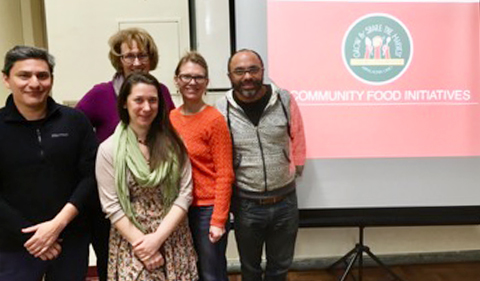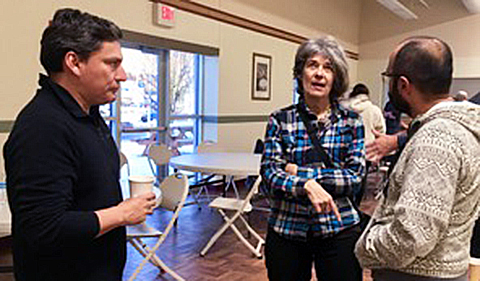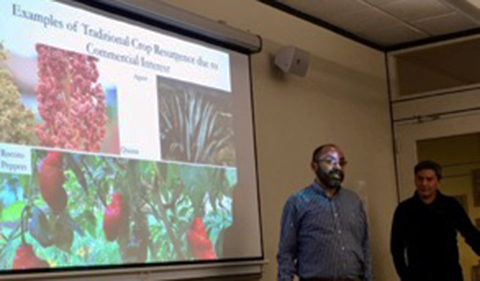
R. Montúfar, T. Moran, M. Nally, D. Bikowski, & M. Ayala at the Community Food Initiatives’ Seed to Sustainability Workshop in Athens, January 2018.
By Dawn Bikowski
Director of the English Language Improvement Program
How do the seed-saving practices in Southeast Ohio compare with the struggles and triumphs of food sovereignty in the Andes of Ecuador?
Dr. Rommel Montúfar (Biological Sciences, Pontíficia Universidad Católica del Ecuador), and Michael Ayala (Agricultural Sciences, Universidad Central del Ecuador) traveled to Athens in January 2018 to learn about saving seeds here in our region and to share what they’ve learned from the Andean highland communities about how seed saving can foster food sovereignty and food access.
“Our visit to Ohio University and the areas around Athens was fascinating,” Montúfar shared. “We were able to see how this area struggles with many of the same critical food security issues we have in Ecuador, such as how communities are protecting their traditional food and seed practices and how they are confronting declining agrobiodiversity.”
Montúfar and Ayala saw local food practices up close with a visit to Shagbark Seed & Mill in Athens, where owner Michelle Ajamian gave them a tour of the facility and explained how Ohio-grown seeds, corn, and beans connect the region’s organic farmers with markets throughout the state and Appalachia.

Motúfar & Ayala share stories and knowledge with M. Ajamian, local community organizer and owner of Shagbark Seed & Mill
Montúfar and Ayala began their stay in Athens with presentations at OHIO and then continued on to participate in community conversations about the Ecuadorian experience with seed saving.
“Loss of agrobiodiversity is also due to changes in the patterns of exchange of food and seeds at community level, with community members now reduced to selling and purchasing seeds instead of bartering and giving seeds as gifts,” said Ayala, noting the degree to which seed saving and cultural practices affect the environment.
During the Jan. 20 Seed To Sustainability Workshop held by Community Food Initiatives at the Athens Community Center, Montúfar and Ayala shared what they had learned about food sovereignty and agrobiodiversity in their region. Many community members from around Southeast Ohio found parallels to situations here, such as both communities’ efforts to reduce barriers for small-scale farmers and seed producers. Also speaking at the workshop were Ohio University professors Dr. Art Trese, Associate Professor of Environmental & Plant Biology, and Dr. Paul Patton, Assistant Professor of Anthropology and Food Studies.

M. Ayala & R. Montúfar share their research findings with OHIO faculty and students during the Food Studies “Food for Thought” speaker series
The research presented by Montúfar and Ayala is part of an interdisciplinary project built on an ongoing successful collaboration of OHIO English Language Improvement Program, OHIO Food Studies theme, OHIO Environmental & Plant Biology Department, PUCE, and the Universidad Central del Ecuador. The project is funded by an OHIO Innovation Strategy planning grant, with Dr. Dawn Bikowski (ELIP, Linguistics) as PI and Dr. Theresa Moran (Director of Food Studies) as Co-PI, and with the collaboration of the Vice Provost for Global Affairs, Dr. LJ Edmonds and Director of the Tropical Disease Institute, Dr. Mario Grijalva.
“Our collaborative research has already yielded not only important results, but stronger connections within each community,” Moran said. “Though this is a small project on specific aspects of seed-saving, it’s an area where both Ecuadorian communities and SE Ohio have the real potential to grow greater food sovereignty from information we’re all learning and sharing.”



















Comments